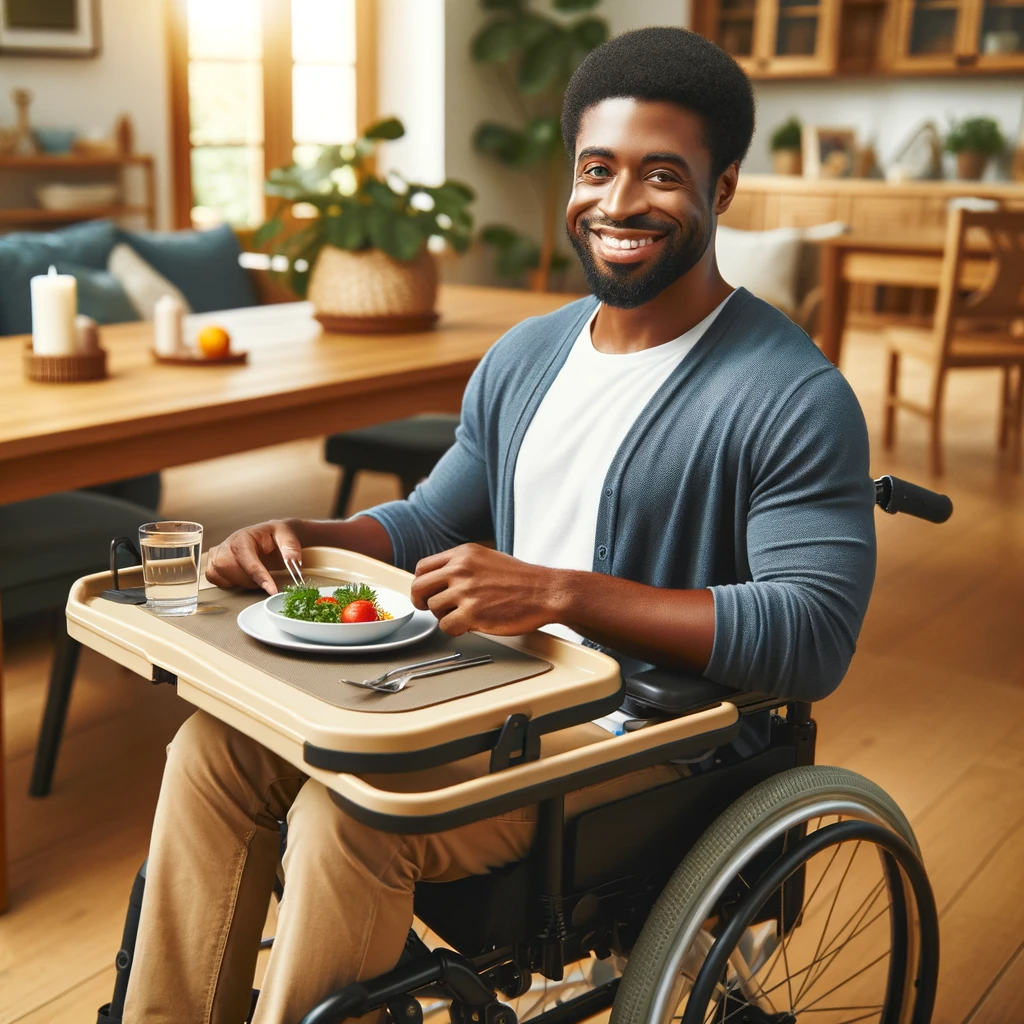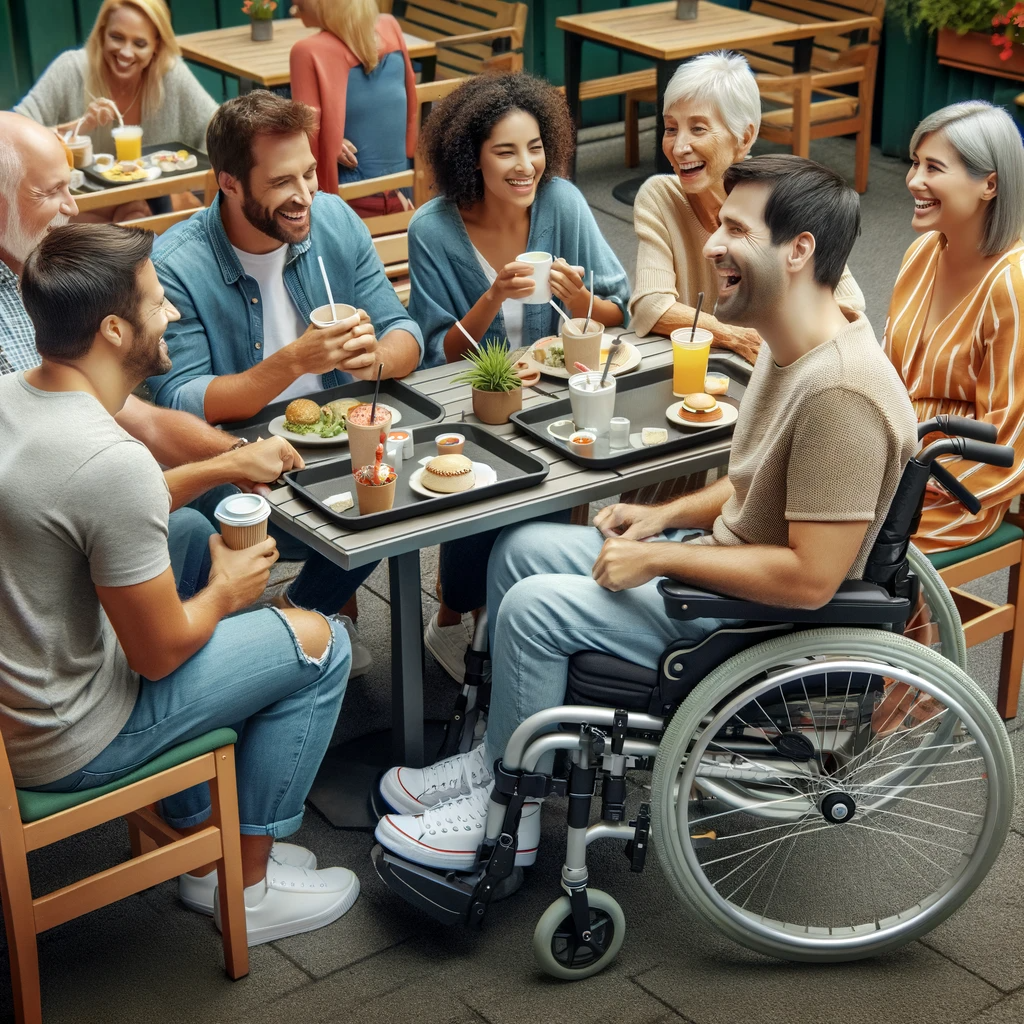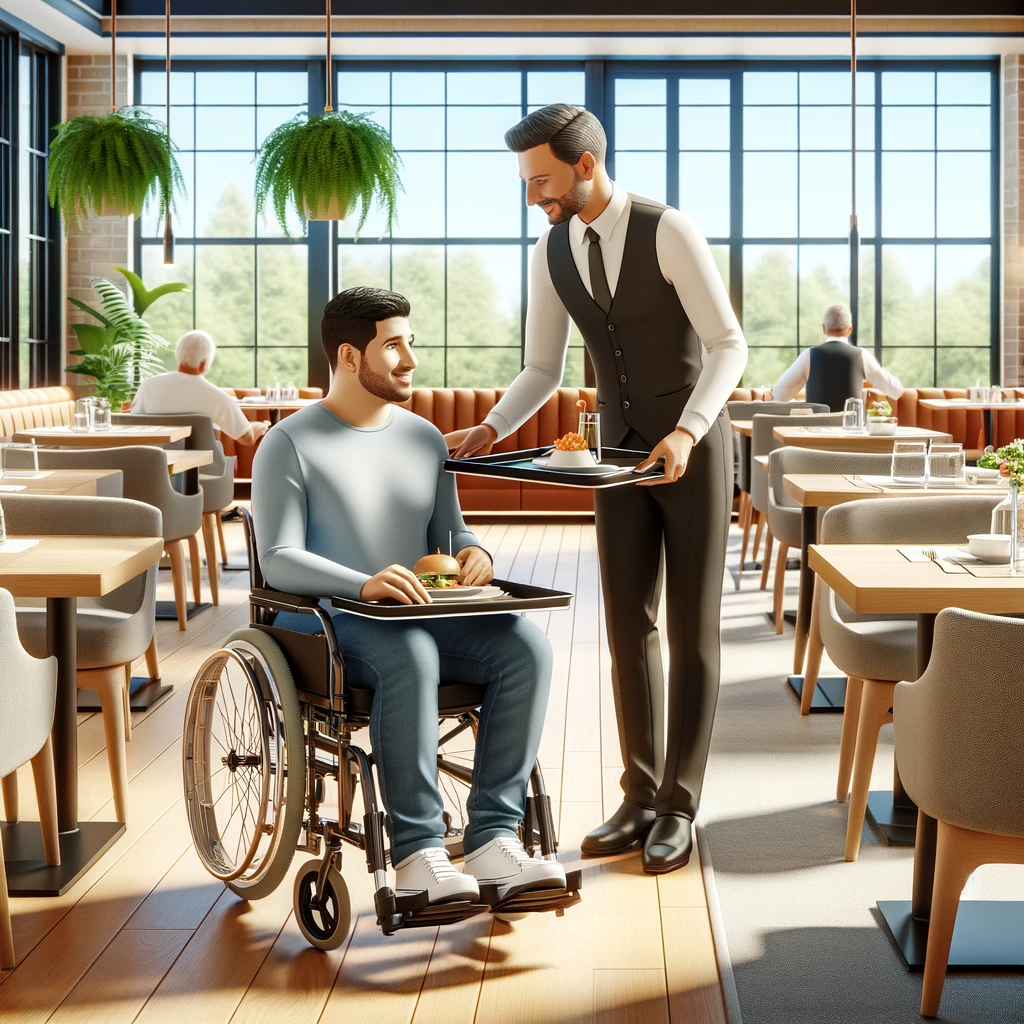Trays and Wheelchair Trays: Essential Tools for Social Inclusion for Disabled People
Lets eat together! How trays can make a difference to social inclusion.
What are trays and wheelchair trays?
- Definition: Trays and wheelchair trays are flat surfaces used on tables or wheelchairs.
- Purpose: They provide a stable platform for food, drinks, and other items.
- Importance: Vital for disabled peopl, aiding in independent eating and drinking, and social activity participation.
How can trays and wheelchair trays promote social inclusion?
- Independence: Enable disabled individuals to eat and drink independently, boosting self-esteem and confidence.
- Participation in Social Activities: Facilitate involvement in gatherings, enhancing social interaction.
- Accessibility: Improve access and reduce barriers, especially in public places like restaurants.
Examples of how trays and wheelchair trays can be used to promote social inclusion
- Spinal Cord Injury: Allows independent eating and drinking in various settings.
- Cerebral Palsy: Supports hands during eating and social activities like games.
- Visual Impairment: Assists in locating food and drinks, preventing spills.
- Developmental Disability: Aids in learning new skills such as using a knife and fork for eating, sensory toys and games.
Benefits of trays and wheelchair trays for social inclusion
- Autonomy and Independence
- Boosted Self-Esteem and Confidence
- Reduced Isolation and Dependence
- Increased Social Participation
- Enhanced Accessibility
- Improved Quality of Life
How to choose the right tray or wheelchair tray
- Consider User’s Needs: Size, shape, and special features like raised edges.
- Intended Use: Different trays for eating/drinking and carrying items.
- Environment of Use: Weatherproof options for outdoor use.
Enhancing Daily Independence: A Comparative Guide to the Tipsi Tray, Topple Tray, and Trabasack Mini Bag and Tray
Understanding Your Options for Enhanced Mobility and Convenience
When it comes to selecting aids that enhance daily living for individuals with disabilities, choosing the right product is crucial. Today, we’re focusing on three innovative products from Disability Health Shop: the Tipsi Tray, the Topple Tray, and the Trabasack Mini Bag and Tray.
Tipsi Tray: A Stable Solution for Shaky Hands
The Tipsi Tray is specifically designed for one-handed use, making it a perfect choice for individuals with conditions that result in shaky hands. Its level and stable design prevents spills, ensuring a hassle-free experience during your daily activities. Learn more about the Tipsi Tray here.
Topple Tray: Lightweight and Portable
Following the Tipsi Tray, the Topple Tray offers a more compact, lightweight solution. It maintains the benefits of single-handed use but adds the advantages of portability and ease. This tray is ideal for individuals who are always on the move. Discover more about the Topple Tray here.
Trabasack Mini Connect Bag and Tray: Versatile and Practical
Combining the functions of a travel bag and a wheelchair tray, the Trabasack Mini Bag and Tray is a game-changer. Not only does it provide a sturdy surface for various activities, but it also offers the convenience of a bag. Its velcro receptive surface ensures that items remain secure during travel. Get more details about the Trabasack Mini Connect Bag and Tray here.
Research showing the importance of sharing food and drink with friends and Family
Research indicates that sharing food and drink and eating with other people is indeed important for social inclusion and well-being. Here are some key findings from the research:
- Importance of Belonging and Togetherness: Studies highlight the significance of belonging, togetherness, and interpersonal support in various cultures and religions, emphasizing that food rituals and communal eating are associated with improved physical health and reduced risks for various health conditions.
- Connection Between Social Eating and Happiness: Research from the University of Oxford reveals that the frequency of eating with others is positively correlated with feelings of happiness and satisfaction with life, indicating the importance of social eating in fostering well-being and social connections.
- Communal Eating and Social Bonding: The Washington Post discusses a study titled “Breaking Bread: The Functions of Social Eating,” which demonstrates a strong connection between communal eating and social bonding, suggesting that communal eating may have evolved as a mechanism for humans to enhance social connections and well-being.
- Evolutionary and Social Nature of Commensality: Scholarly discussions on commensality and food sharing highlight the evolutionary and social significance of eating together, emphasizing its role in connecting individuals as biological organisms to social beings and fostering internal solidarity.
- Food as a Means of Inclusion and Exclusion: The sharing of food is recognized as a means of inclusion, while eating separately or differently may contribute to exclusion. Food can serve as a language through which social affinities are expressed, and prohibitions on specific foods may differentiate between social selves and others[5].
In summary, the research consistently underscores the importance of sharing food and eating with others as a fundamental aspect of social inclusion, well-being, and the formation of social bonds across various cultures and societies
Where to purchase trays and wheelchair trays
- Sources:
- Medical Supply Stores
- Online Retailers
- Disability Organizations
- NHS Wheelchair services may provide a tray, but it is not standard
Why we need the right wheelchair or specialist trays!
Trays and wheelchair trays play a crucial role in fostering social inclusion for disabled individuals, enhancing independence, participation, and quality of life.



